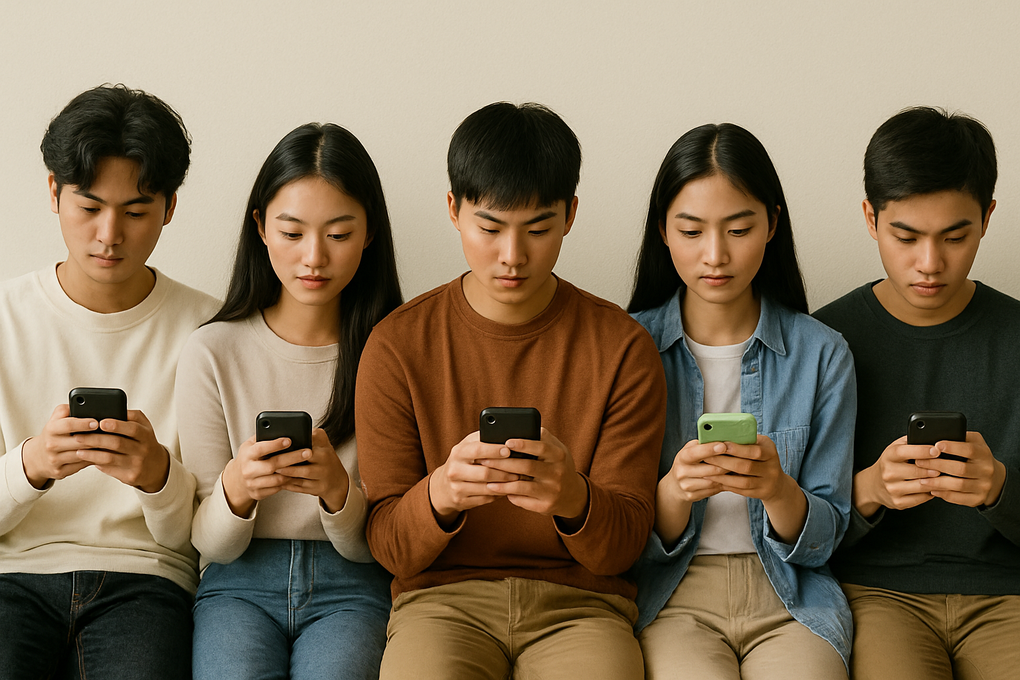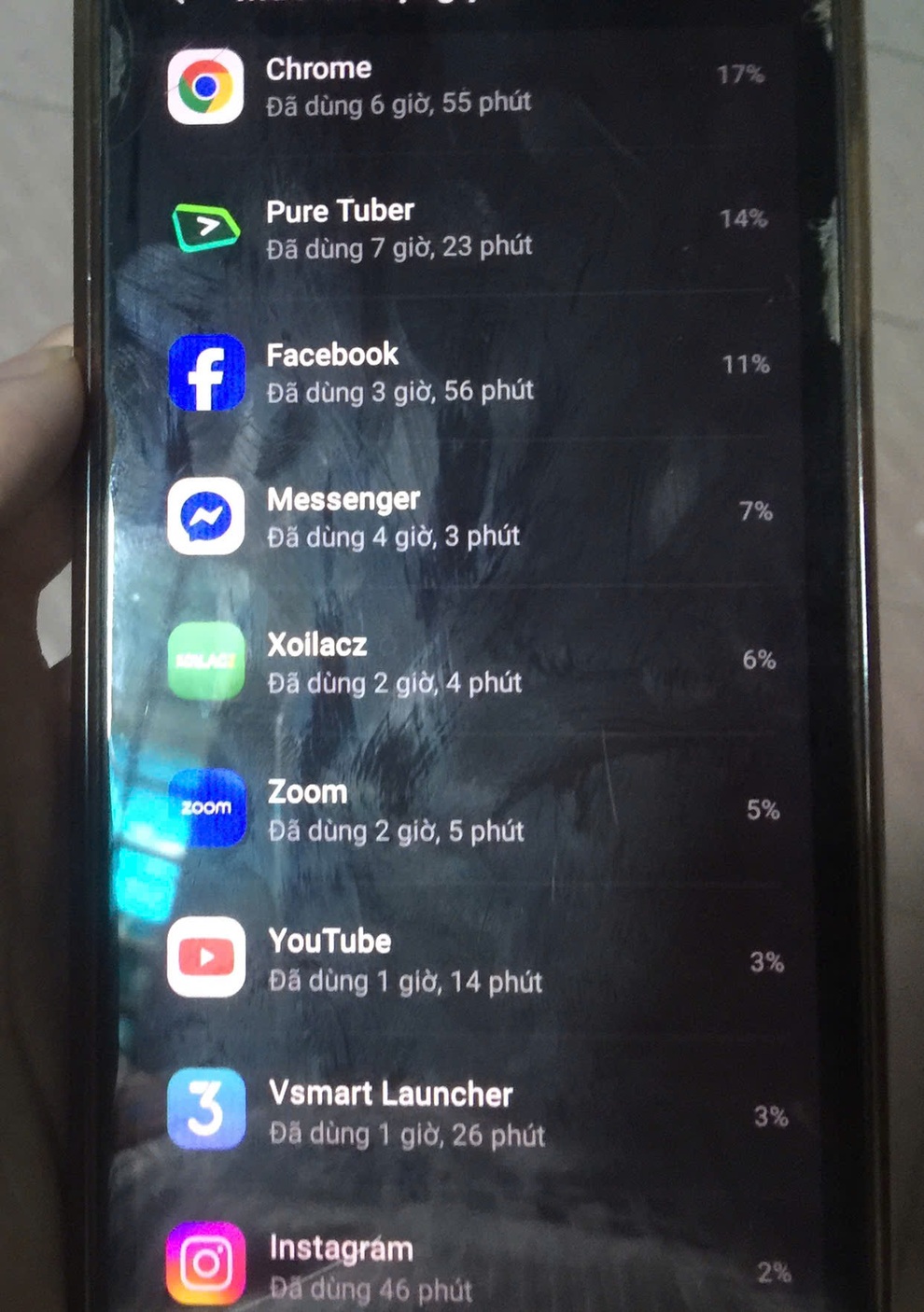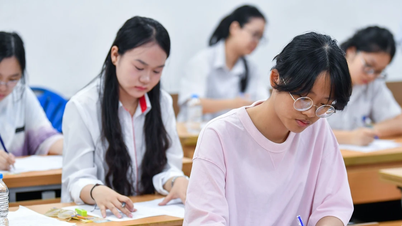Use anytime, anywhere
A research topic conducted by the Central Secretariat of the Vietnam Student Association on a survey of 26,300 students nationwide in 2023 showed that: More than 97% of students use two social networks, 85.1% of students choose "going on social networks" as their daily activity, of which entertainment purposes account for the highest percentage at 91.4%.
These numbers show that social networks play an important role in the lives of most students today and are perhaps inseparable for many.
When asked if he had ever thought about not using social media for a while, Tran Minh Quang, a student at Hanoi National University of Education, confided: "It's really hard to imagine a day without social media.
From the moment I wake up, I scroll through Instagram and TikTok to see what my friends are posting. When I go to school, sit at a coffee shop, or even wait for the bus, I take the opportunity to check my notifications.
Social media helps me connect with people, stay updated with news, and sometimes just entertain myself with funny videos. There are also times when I surf without a clear purpose, maybe because I'm used to it."

Social networks are becoming indispensable for every student (Illustration: AI).
Sharing the same thought, Le Manh Quang, a student at Hanoi University of Culture, said: "Every morning, before doing anything, I have to open Instagram or Facebook to see what new things happened while I was sleeping. I feel like something is missing if I don't browse social networks, like I'm missing something important."
Meanwhile, Nguyen Hoang Long, a student at the University of Architecture, admitted: "There are days when I spend 6-7 hours just surfing Facebook or watching videos on YouTube.
Whenever I intend to do something, I accidentally get caught up in it. Sometimes I intend to watch for only 5 minutes, but end up sitting for hours. My studies are delayed, my homework is piling up, but I still can't resist surfing the internet. Partly it's to relax, I know it's an abuse, but I have to endure it."
There is no denying the benefits that social networks bring to students. It is a tool to connect with friends, expand relationships, update information quickly and access rich learning materials. But on the contrary, if used unreasonably, it can bring unpredictable consequences.
What is the impact?
"Just ask, I know all the drama!". That was the answer of a student when asked about the recent social media scandals. Notably, this student also said that he spent money to join the livestream about the scandals involving some young artists recently.
Sharing the same passion, Pham Van Duong, a student at the Foreign Trade University, said: "Every time I was about to go to sleep, there would be a Facebook notification about the latest news of the drama, so I had to wake up to watch." It is worth mentioning that Duong's sleepless nights lasted until the scandals died down.
According to the Ministry of Labor, War Invalids and Social Affairs, young people in Vietnam spend 7-8 hours a day on social networks and this number has been increasing in recent years.
In October 2024, at a workshop on "Social networks and mental health of adolescents in Vietnam", the Institute of Preventive Medicine and Public Health (Hanoi Medical University) pointed out that social networks can have negative impacts on mental health if used too much.
Among them, depression, insomnia, anxiety, and distraction in studying are a series of mental health problems that young people will have to face.

Time spent on social media by a student (Photo: HT).
However, Le Manh Quang, a student at Hanoi University of Culture, has a different opinion: "I use social networks to read news, watch entertaining videos, and keep in touch with friends far away. I surf almost every time I have free time, except when I go to bed.
I don't call it an addiction, it's just that social media is so convenient, it's more like a habit or something to do. For example, I can learn about new technology, learn tips, or even join study groups on Facebook."
Habit or "addiction"?
A 2005 statement by Dr. Keith W. Beard, Wright State University, USA, pointed out that: "An individual is addicted when an individual's psychological state, including their mental and emotional state, as well as their academic, occupational, and social interactions, are impaired by abuse."
According to the World Health Organization (WHO), addiction is a state of periodic or chronic dependence on substances or behaviors. This state is characterized by the inability to control behavior repeatedly, despite negative effects and consequences, in order to achieve the goal of keeping people in a state of immediate pleasure, or reducing unpleasant feelings.
Thus, it can be understood that using social networks or viewing content on these platforms too frequently to stimulate joy or to dispel negative feelings, or even using them without a purpose for a long time, can be understood as excessive Internet abuse.
Master Lai Vu Kieu Trang, a psychology lecturer at Hanoi University of Culture, said: "It is difficult to accurately measure the level of addiction, but if we consider the frequency of use, many students are showing signs of dependence on social networks.
They spend hours surfing the internet, and when they don't surf, they feel restless and uncomfortable. It's not just a habit because it's when you use it with a purpose, but many people surf social networks without knowing why."
"Prevention is better than cure. Students need to be aware of the two sides of social networks to control the time spent on them and avoid becoming addicted. Changing habits is not easy, it requires strong will and perseverance. Gradually reduce the time spent surfing the internet, starting with small but steady steps," she emphasized.
Nguyen Phuong Thao, a student at Hanoi National University of Education, also shared: "I used to think that life without social media was impossible. I like posting stories, watching friends' comments, and following KOLs (influencers) to learn how to coordinate outfits or apply makeup.
But a few months ago, I decided to "quit" social media for a week to focus on studying for exams. The first few days, I was restless, wanting to pick up my phone and surf the web. But gradually, I found myself working more effectively, having time to read books and talk to my family."
Social media, when used properly, is a useful tool. But as social media becomes the center of our lives, students need to rethink how they balance the virtual and real worlds.
Hoang Tien
Source: https://dantri.com.vn/giao-duc/anh-cu-hoi-di-lum-xum-gi-em-cung-biet-20250502200634894.htm


![[Photo] General Secretary concludes visit to Azerbaijan, departs for visit to Russian Federation](https://vphoto.vietnam.vn/thumb/1200x675/vietnam/resource/IMAGE/2025/5/8/7a135ad280314b66917ad278ce0e26fa)
![[Photo] General Secretary To Lam begins official visit to Russia and attends the 80th Anniversary of Victory over Fascism](https://vphoto.vietnam.vn/thumb/1200x675/vietnam/resource/IMAGE/2025/5/8/5d2566d7f67d4a1e9b88bc677831ec9d)
![[Photo] President Luong Cuong presents the decision to appoint Deputy Head of the Office of the President](https://vphoto.vietnam.vn/thumb/1200x675/vietnam/resource/IMAGE/2025/5/8/501f8ee192f3476ab9f7579c57b423ad)

![[Photo] Prime Minister Pham Minh Chinh meets with the Policy Advisory Council on Private Economic Development](https://vphoto.vietnam.vn/thumb/1200x675/vietnam/resource/IMAGE/2025/5/8/387da60b85cc489ab2aed8442fc3b14a)
![[Photo] National Assembly Chairman Tran Thanh Man chairs the meeting of the Subcommittee on Documents of the First National Assembly Party Congress](https://vphoto.vietnam.vn/thumb/1200x675/vietnam/resource/IMAGE/2025/5/8/72b19a73d94a4affab411fd8c87f4f8d)

















































![[Photo] Prime Minister Pham Minh Chinh talks on the phone with Singaporean Prime Minister Lawrence Wong](https://vphoto.vietnam.vn/thumb/402x226/vietnam/resource/IMAGE/2025/5/8/e2eab082d9bc4fc4a360b28fa0ab94de)






























Comment (0)